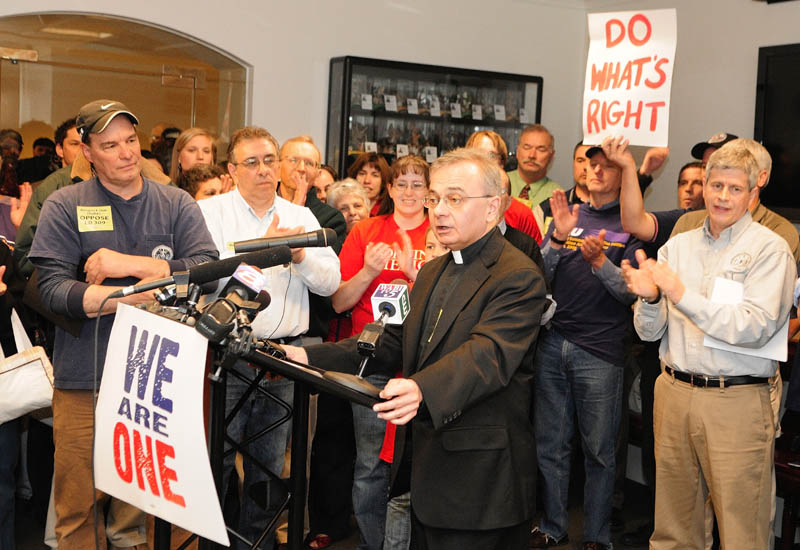AUGUSTA — A legislative committee took no action on a controversial labor bill Wednesday, avoiding a recorded vote on a measure that would have removed the requirement that state employees pay a portion of union dues, even if they are not union members.
Officially, the bill is still alive. If the committee takes no vote, the bill will be placed on the House calendar for consideration; but it’s unlikely to be debated unless Republicans round up the votes needed for passage.
Labor leaders who brought more than 100 union workers to the State House to protest the bill Wednesday say they don’t think Republicans have the votes, but they aren’t taking any chances.
“Until they kill this, we’re going to be here every day,” said Maine State Employees Association Executive Director Chris Quint.
Senate Majority Leader Jonathan Courtney, R-Springvale, said labor unions have muddled the issue successfully to make the public think the bill is much broader than it is. Courtney and others support repealing a law put in place in 2007 by the Baldacci administration that requires all state workers to pay a portion of union dues, even if they choose not to join the union.
“They think it’s an assault on collective bargaining rights,” he said. “It isn’t. It’s repealing something for state workers, not all workers across the state.”
Courtney added that he doesn’t think the issue is worth debating unless there’s reason to believe there are enough votes to pass it.
Democrats and labor unions insist that the bill, L.D. 309, is still alive because Gov. Paul LePage wants to get it passed this session.
“I don’t think the governor can let go of it,” said Sen. Troy Jackson, D-Allagash.
LePage spokeswoman Adrienne Bennett said although the governor supports the bill, he hasn’t been lobbying lawmakers to pass it.
“There’s been no directive from the governor to take this up,” she said.
LePage has been consistent in his support since the bill first came up last year, saying that he doesn’t think the state should garnish wages to help support the union.
Union leaders and community supporters say it’s not fair for all workers to reap the benefits of contracts they negotiated without at least contributing some funding to cover the cost of collective bargaining.
“If public employee unions are required by law to represent all workers for contract negotiations, including those choosing not to be in unions, then everyone should pay their fair share for that service,” said the Rev. Mike Seavey of Portland. “This is both ethically and morally sound and should remain in our state laws.”
Susan Cover — 620-7015
scover@mainetoday.com
Send questions/comments to the editors.



Success. Please wait for the page to reload. If the page does not reload within 5 seconds, please refresh the page.
Enter your email and password to access comments.
Hi, to comment on stories you must . This profile is in addition to your subscription and website login.
Already have a commenting profile? .
Invalid username/password.
Please check your email to confirm and complete your registration.
Only subscribers are eligible to post comments. Please subscribe or login first for digital access. Here’s why.
Use the form below to reset your password. When you've submitted your account email, we will send an email with a reset code.